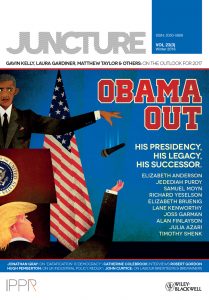On the ethics and consequences of Project Prevention: When sterilization becomes a treatment option
Although the organization started in 1997, a recent BBC News article and Radio 4 interview have drawn attention to the highly controversial Project Prevention, a US-based non-profit that offers sterilization to drug addicts. In exchange for $300, “clients,” as the organization calls them, “consent” to “long term contraception” or “long term sterilization” in order to prevent them from having children that they are “unable to care for.” According to the “Objective” page of Project Prevention’s website: “The main objective of Project Prevention is to reduce the number of substance exposed births to zero. In doing so, Project Prevention seeks to reduce the burden of this social problem on taxpayers, trim down social worker caseloads, and alleviate from our clients the burden of having children that will potentially be taken away.” Critics, including National Advocates for Pregnant Women, assert that using sterilization as a tool is similar to social engineering due to its privileging of certain populations for child rearing. Other critics feel that drug treatment is more effective. When interviewed by BBC News, Barbara Harris, the founder of the organization, stated, “So people tell me that I should be focusing on drug treatment not birth control but drug treatment is such a gamble, you know? Women go in there, they get off drugs, they go back on drugs but that doesn’t keep them from getting pregnant.” According to the BBC News article, Project Prevention has paid money out to 3,242 “clients,” 1,226 of which were permanently sterilized.
But is drug treatment really more of a “gamble,” as Harris suggests? If the underlying issue is that female drug addicts are reproducing at uncontrollable rates and are unable to take care of their children, wouldn’t drug treatment be more of a stable reaction than sterilization? The ability to reproduce is attached the psyche of a woman (exploitation of that condition is another story), and it would then follow that taking that ability away has distinct consequences. Are these “clients” prepared with information and consent forms? As drug addicts, do they know exactly what they’re signing up for? This question is listed on Project Prevention’s website and they answer in the following way: “If you can not trust someone with their reproductive choices, how can you trust them with a child?” While this statement appears a bit unsympathetic, Barbara Harris’ genuine concern for this troubled population is anything but unsympathetic. During her interview with BBC News, she consistently makes the case for sterilization/long-term contraception as a solution for low-income women – of all races – to exit the cycle of accidental reproduction. However, the question must be asked: Didn’t the US doctors who sterilized black, Hispanic and Native American women think that they were making a positive social contribution? To date, there has been no independent verification of Project Prevention’s statistics or figures on their “clients” and procedures.
 Drug Addition from The Dictionary of Family Therapy
Drug Addition from The Dictionary of Family Therapy
 Eugenics from The Blackwell Dictionary of Modern Social Thought
Eugenics from The Blackwell Dictionary of Modern Social Thought




1540-6237/asset/SSSA_Logo-RGB.jpg?v=1&s=c337bd297fd542da89c4e342754f2e91c5d6302e)
Also of concern here is the safety of long term sterilization/contraception. Some of these options result in side-effects that cause permanent sterilization, put women at greater risk for ectopic pregnancies, cause long term menstruation, and more. It seems that there are many other options, aside from risky long term sterilization/contraception.
I wonder has Ms. Harris, or any of her staff, undergone the procedures? Would they make this choice for themselves if they wanted a long term sterilization/contraception option? And if they would not, why do they offer it to others?
Keri
I’ve seen at close hand the damage that can be wrought on the offspring of serious junkies. My partner was born HIV+, to junkie parents, was an IV drug user from age 10, spent the first 18 years of his life in-and-out of care and young offender institutions. He himself had fathered three children by the age of 17, none of whom is he ever allowed to see by Social Service (and he finds that extremely difficult and hurtful).
In the 14 months since he turned 18, he’s put himself through re-hab, and is now stable on prescribed methadone with only a very occasional pipe of anything naughty. He has a place to stay (Council bedsit), has rebuilt his relationship with his mother (who is now also “clean”) and step-siblings. He has a (fairly) stable relationship with me (as much pseudo-parental as anything – we’re not lovers, though definitely “partners”) and hopefully a space to allow him to enjoy the last of the childhood he has not generally had, while supporting him in becoming a useful adult. He’s currently negotiating for a full re-build of his teeth (destroyed by smoking crack and a street-homeless diet), and with starting college in September. If the recently-diagnosed TB doesn’t kill him this year, he has a bright life ahead of him.
So I can understand the feeling that it’s better for junkies not to have kids. But permanent sterilisation is not the answer – it’s a gross and disturbing invasion of the rights of people who are usually not in a sound mental state to make such decisions. This “Charity” should be investigated, and no reputable medical practitioner should accept any referral for sterilisation from them – and should be “struck off” if they do so.
‘scuse the long rambling post … difficult to be calm about this with the lad asleep on my bed two feet away as I type this.